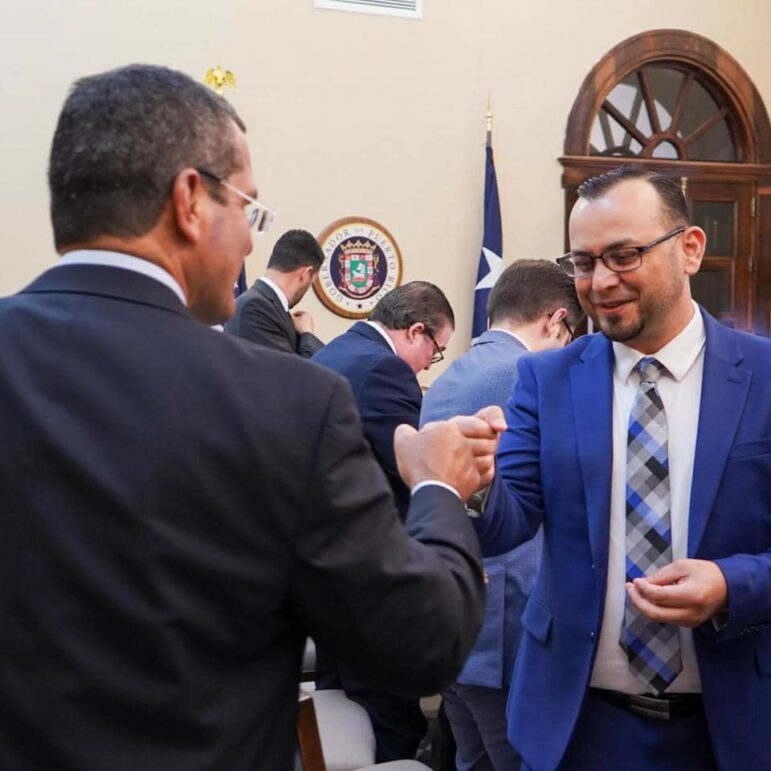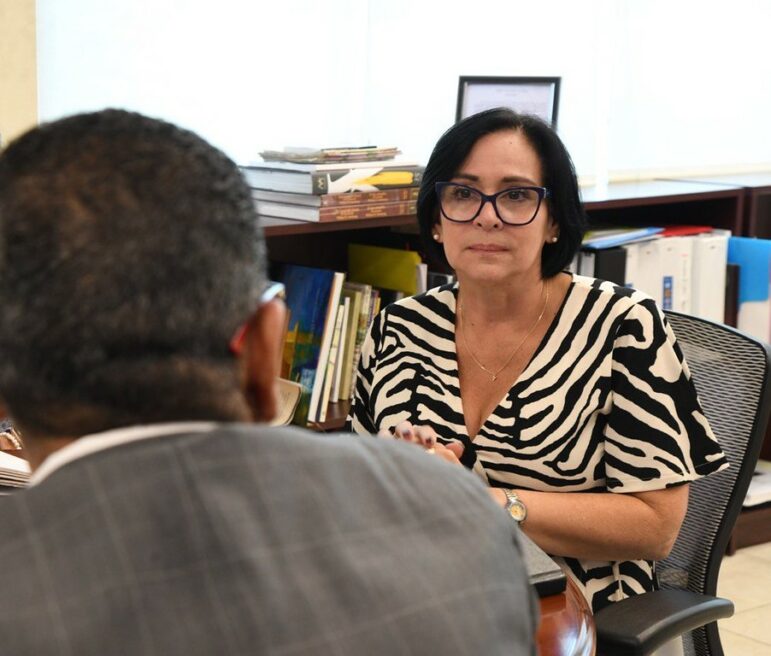Since her sworn statement before the Justice Department saying that she has been subjected to reprisals in the Department of Education (DE), government employee Marily Zayas Torres has been paid her biweekly paychecks late, to the point that she didn’t have money to buy a gift for her son on his 15th birthday.
The 44-year-old woman, head of her household, has been using her vacation and sick leave days because the DE did not allow her to perform her duties, she alleged in an interview with the Gender Investigative Unit, an alliance between Todas and the Center for Investigative Journalism (CPI, in Spanish).
Zayas Torres directed, on an interim basis, the Human Resources Office at the Bayamón Regional Education Office (ORE, in Spanish) for almost five years, from October 1, 2017 to March 8, 2022. She is one of the 15 people who, in May 2022, testified under oath against the former Associate Deputy Education Secretary, Héctor Joaquín Sánchez Álvarez. Her allegations of wrongdoing included the former superintendent of the Bayamón ORE, Yanira Raíces Vega, currently Governor Pedro Pierluisi’s Secretary of Education nominee.

Photo taken from Facebook
On March 4, 2022, at 9:47 a.m., Raíces Vega called her, in a conference call with Sánchez Álvarez, who asked her directly about the appointments of three Orocovis administrative assistants, which had not been approved and sent to the assistant secretary of Human Resources, at the central level.
This temporary position has a monthly salary of between $1,407 and $1,735, according to the job description.
Zayas Torres recalled that, in the call, she told the then Deputy Secretary that she had already named all those who met the requirements, and those who did not, could not be appointed. He allegedly told her that “she couldn’t be a roadblock,” according to the complaint she filed with the DE.
A Chain of Reprisals?
Just four days after that call, Raíces Vega called her to a meeting to tell her that, starting the next day, Duhamel Adames Rodríguez would replace her in her position as interim director of Human Resources. Raíces Vega allegedly told her that she was following instructions from Sánchez Álvarez, according to her affidavit.

Photo taken from the Department of Education’s official Facebook page
“They withdrew all my access and permissions [from the computer]. I had no access to anything. As a specialist, I have to have access to Kronos, Staff, to the Human Resources platform, SEPI [Electronic System for Irregular Personnel]. I couldn’t even check the doping tests. Even if they had removed me as interim director, I was a Human Resources specialist anyway, which gave me access,” Zayas Torres said.
Adames Rodríguez was director of the Pedro Albizu School in Toa Baja, whom Raíces Vega brought to the ORE in Bayamón as her assistant. In addition, he has held New Progressive Party political posts for at least 20 years. According to what he has said in interviews with the media, he has been electoral commissioner for Precinct 18 since 2001, was a municipal legislator for Vega Baja, and worked as director of the former representative’s office for district 11 (which includes Vega Alta, Vega Baja, and Dorado), María Vega Pagán. In 2014, he announced his aspiration for a district legislator position, but he did not become a candidate.
With Raíces Vega’s nomination as Secretary of Education, Adames Rodríguez went on to occupy his position as interim regional superintendent of Bayamón, a city near San Juan.
Adames Rodríguez did not respond to a call to his mobile phone or a text message. He also did not reply to a message to his official email.
Regarding these events, Raíces Vega replied in writing to the Gender Investigative Unit that the appointments of her trusted personnel in the region “were based on the search for efficiency for the areas; under no circumstances did they respond to reprisals.”
In an interview with this media outlet, the former university professor and Ph.D. in Public Administration, Palmira Ríos González, said this case “is one more example that when the principle of merit and politicization are confronted, politicization prevails over the principle of merit,” something that she believes should be avoided through clearer public policies.
Sponsored Appointment
As part of the criminal investigation on the situation in the Department of Education that began in July 2022, the prosecutor of the Justice Department’s Public Integrity and Comptroller Affairs Division, Tamara Martínez Rosado, found that Laura D. Santiago’s application for Orocovis’s administrative assistant position — which was in dispute — had a sticky note saying that she had been recommended by Orocovis Mayor Jesús Colón Berlingeri, according to the ruling by the Panel on the Special Independent Prosecutor (PFEI, in Spanish). Santiago only had a high school diploma, so she did not meet the minimum associate degree requirement to be an administrative assistant.

Photo taken from Facebook
When approached by this media outlet, Colón Berlingeri said “everyone who asks me for my help [for a job], I will back them.” He also said the staff at the ORE in Bayamón usually ask his opinion about openings in schools in Orocovis.
Meanwhile, Raíces Vega said selecting [people for] positions were based “on the people’s merits, knowledge, experience and skills, not on the recommendations of mayors or legislators.”
This is the only position that remained vacant in the Bayamón ORE for which the call for personnel was reopened in July 2023, at the Ángel Rafael Díaz Colón School in Orocovis. The minimum requirements are an associate degree from an accredited university and one year of experience in a similar job.
The PFEI found, in its resolution of April 4, that Sánchez Álvarez did not exercise undue influence or undue intervention in the matter, since “he never ordered the applicants to be recruited, even if they did not meet the minimum requirements. He also did not ask her to call any politician on that matter.”
The Alleged Reprisals
Zayas Torres recalls that, after she was removed from the interim post, she spent two weeks looking at the computer screen, unable to do her work and without access to the Human Resources platforms, for which she decided to use up her leaves. “What was I going to go in for? To look at a computer… I’m not willing to do that, that’s stealing,” she explained in an interview.
However, both the PFEI and the Justice Department determined that there was no retaliation. “When specialist Zayas Torres returned to her permanent position, she did not experience a change in salary, benefits, hours, or location. She remained in the same office and [got] the same compensation, because the salary raise she received was not based on her position as director. Specialist Zayas Torres did not have an expectation of permanence in the position of director, since she was in an interim position,” according to the PFEI’s resolution dated April 4, 2023.
“Of course, there were reprisals… Those are all reprisals,” Zayas Torres reacted regarding the limitation of her duties.
She said she decided to use her vacation and sick leave balance. “I had to start depleting my entire balance,” she mentioned. Even though her lawyer has tried to reach the DE several times, she said they have not responded, so she has no choice but to request an unpaid leave.
“I’m divorced, head of household. The only livelihood I have for my home is my job. This paycheck was [around ] my son’s birthday: he’s 15 years old! But no, I didn’t get paid,” she lamented. When she was asked if she had been able to buy her son a birthday gift, she replied: “Nothing.”
She described it as further retaliation having received salary cut letters because her supervisor allegedly did not approve her leave. This started to happen shortly after she filed a complaint about these events in the DE on May 20, 2022, which were referred to Justice.
Zayas Torres received at least six pay cut notifications as of September 2022.
For example, on February 24, 2023, the interim Assistant Secretary for Human Resources, Marlene Rosa Medina, sent Zayas Torres a notice of a salary deduction of $2,035, “for not having submitted or received justification approval from your supervisor” to record (against the leave balance) 82.3 work hours in the two-week period ended February 15, 2023.
The Justice Department’s summons to attend as complainant and witness had been scheduled for November 9, 2022, and for December 6, 2022, for an affidavit.
“I haven’t been able to go back to work because I’m scared of reprisals,” the woman said in a conversation with the Gender Investigative Unit, in August. “If they can get away with this, they could get away with anything,” she added.
Experience and Commitment: ‘None of that Mattered’
Zayas Torres began her career in the DE as a general services assistant under contract in 1997. Three years later, she was made permanent as Clerk II, during former Governor Pedro Rosselló González’s administration, according to the certification of the Non-Teaching Personnel File. Six years later, she was promoted to Clerk III. In March 2009, she moved on to a position of trust as an aide to the Assistant Secretary for Auxiliary Services, where she remained until January 2013 when the Popular Democratic Party administration won. In September 2017, she competed and was promoted to Human Resources Specialist, a position she holds to this day.
“My mother died on July 4, 2021. On July 6, I had a wake for her and the next day, I was already at work because there were set timelines and interviews that had to be done. None of it mattered. Why? Because I didn’t go along with the scam,” she added.
The scam to which she’s referring is the request to appoint someone who was unqualified, in response to the mere demand or arbitrariness of her supervisors.
The PFEI found, after examining the file sent by Justice, that Zayas Torres’ interim appointment “was not recorded in the Human Resources Office at the DE’s central office, so for the purposes of the DE it did not exist,” something that greatly surprised the employee. “That memo [that informs all the personnel about the interim appointment] was in my file. And, to give me access, they must have that go ahead from the central level,” she explained.
On October 1, 2018, Raíces Vega issued a memo to the Bayamón ORE’s staff and the DE notifying that Zayas Torres would exercise the duties of interim director of Human Resources, “until further notice.” The then assistant secretary of Human Resources at the DE’s central office, María Franco, asked the Computer Center for permission or access to the digital platforms that she would get through her appointment.
The Human Resources directors who succeeded her at the Bayamón ORE — Duhamel Adames and Ernesto Toro — are school directors, with no experience as Human Resources specialists. The job requirements are supposed to be established by the Classification Plan, but the DE did not provide a copy of this document to the Gender Investigative Unit as of press time.
Prior to this incident, in 2021, Zayas Torres had satisfactorily passed the two-year probationary for the permanent position as Human Resources Specialist I, a position for which there was an open call and she competed. On September 8 of that year, the then Assistant Secretary for Human Resources, Frances Pelet Román, signed the report certifying that the employee had gone from probationary to regular status. The final evaluation that Raíces Vega made, that same day, indicated that she had exceeded what was required in the 14 criteria for evaluating her performance.
The Uneven Effect of Politicization
Although politicization and political discrimination affect all employees regardless of gender, these illegal practices — culturally legitimized — have a greater impact on certain vulnerable groups, including women. “It puts the woman, especially if she is the head of the family, who is probably the only source of income for that family, in the most precarious position,” said Ríos González.
Most public employees are women. In the DE, 80% of public-school teachers are women, according to data that the agency provided to the Puerto Rico Institute of Statistics.
“Gender perspective is to understand the impact a decision will have on these workers. Politicization is adding another layer of discrimination and precariousness on women. It will make promotion by merit and work difficult; it will affect the correct evaluation of skills and abilities,” Ríos González said.
She added that, since there is a general attitude that women are going to follow orders, “any resistance [from a woman] is going to have a much stronger repercussion. It’s a patriarchal attitude that still prevails in public service.”


